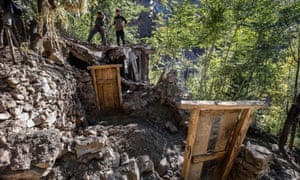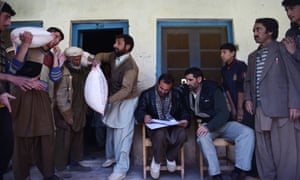
The magnitude 7.5 earthquake that rocked parts of Pakistan and Afghanistan last week has left hundreds dead, most of them in the far more densely populated Pakistan. Rescue and relief efforts have swung into action, albeit hampered by the constraints of reaching hard-hit communities in remote, mountainous areas. And alongside these efforts come the usual politicking and promotion of political agendas that take place after a natural disaster.
In Pakistan, much is being made of the reliable and efficient efforts of the military. American news agencies have already taken the lead in informing us how Islamist militant groups such as the “Wafaq-ul-Madaris-e-Arabia, Pakistan’s largest federation of seminaries in the Deobandi school of Islam”, are joyous at the increased number of worshippers in mosques.
Soon we will hear how the failure of the state to respond with adequate disaster relief services for those affected has resulted in Islamist charities making political inroads into those same communities. Experts will tell us, much like they did after the Kashmir earthquake in 2005 and the flooding disaster in 2010, that the“void” left by the state is being filled by hardline Islamist groups who are using their rescue and relief services to win the hearts and minds of disaster victims. They will say that, in their desperation, Pakistan’s hapless masses are easy prey to extremist politics and values. We have seen this movie before.
The story around disasters in Pakistan being used by Islamist groups to recruit and radicalise young people because the civilian state (never the army) remains absent is a familiar one. It is also undoubtedly one that will be rehashed in the aftermath of the most recent natural disaster, despite there being credible evidence that it is simply not true.
There are studies based on rigorous research which have emphatically concluded that politically motivated violence is, by and large, not dependent on the economic conditions of the actors. We also know that the “new generation” of Islamists are well educated and well connected to the outside world, not those who live in remote regions on the extreme margins of society. Yet the fear after a large natural disaster that affects the most economically and socially vulnerable in Pakistan has, in the recent past, irrationally been one of increased Islamist radicalisation. This narrative assumes poor people have no power.

This has resulted in international disaster relief being disbursed not necessarily in ways that are most effective or most needed, but rather around what can earn goodwill.
After the 2010 flooding in Pakistan, bags of food aid that were not an urgent need were distributed in large quantities by a bilateral agency, with the “from the American people” labelling. A few years later, while doing field research in post-disaster areas in southern Pakistan, a number of my respondents made a point of expressing how patronised they felt by the politics of disaster relief. Even people who had suffered significant economic loss in the flooding disaster did not want bilateral agencies or Islamist groups simply to assume that their poverty made them politically powerless, unable to exercise political choice or voice. Despite the situation, they said they would not be politically swayed by bags of food aid.
“Those people think we don’t understand their agenda, but we understand everything,” I was told by one middle-aged man from a farming community, who had received disaster relief from a bilateral agency in 2010.
While almost all international attention during the 2010 flooding was on what Islamist groups were doing or not doing, far more pertinent to the lives of the millions affected was the way in which the state reached out to those affected by disaster. One told me that had the state not provided cash transfers and food aid,“we would have starved to death”. My own research illustrates that the flooding resulted in the state in Pakistan reaching out to people in an unprecedented way. These citizens, who are too often cast as powerless in the face of powerful political forces, were also seen to be making new demands of the state. This interaction between the state and its people in the aftermath of the disaster ushered in a new era of relatively progressive state-citizen relations.
Last week’s earthquake has once again given the Pakistani state an opportunity to reach out to people in parts of the country where its presence has, historically, been limited. Any international aid that is provided should help establish this relationship between the state and its estranged citizens, rather than focusing on ineffective strategies to counter Islamist politics that we know don’t work.
Source: http://www.theguardian.com/
Updated On: 4 November 2015